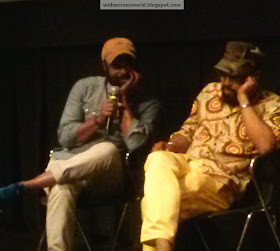The 2013 Summer Reading Classic Film Book Challenge is an event in which the goal is to read and write about a variety of books related to classic film, hosted by Out of the Past. For a complete list of the rules, visit the website.
I took Ernest Hemingway's For Whom the Bell Tolls with me to read when I spent the summer in Barcelona, Spain, twenty years ago. This was during a period in my life when I felt compelled to read as many literature classics as possible. I was in college at the time, so that may have been part of the reason why. Tolstoy, Lawrence, Hugo, Melville, Dickens, you name it, I either read something by them or they were on my to-read list.
I didn't return to them very often, however. For all of this old-school lit I was consuming, very little of it stuck with me, resonated with me. I suppose it might've been the slightly antiquated language. I was young, after all, and not used to reading such flowery, formal prose. There were exceptions, though: D.H. Lawrence stuck. The Iliad fascinated me for a little while. Moby-Dick held my interest.
Reading Hemingway while in Spain didn't necessarily enhance my experience of traveling outside my native country for the first time, unfortunately. I don't recall what my initial impression of Bell was. While I did take time to read it, it's not like I could make any correlation between the story and the things I was experiencing. I mean, it's set during the Spanish Civil War and here I was, an art student traveling with other artists in a very modern, cosmopolitan city.
 |
| Ernest Hemingway |
I've never seen the film version with Gary Cooper and Ingrid Bergman, so I don't have that as a basis for comparison, which is kinda good in a way; apparently, the film version was up for nine Oscars including Best Picture and all four acting categories.
I get that Hemingway spent a lotta time in Spain and wanted this book to be as authentic in its depiction of Spanish culture as he could, but that doesn't mean I cared for that much. He wrote the English dialogue as a direct translation of Spanish, so it's grammatically correct in Spanish even if it sounds funny in English. Also, the characters often switch back and forth from an older dialect, in which they all say "thee" and "thou" and stuff like that, but it's unclear why they switch and what the rules are for switching. I found that very off-putting. Plus, the literal word "obscenity" is used whenever a cuss word could conceivably be said, as in, "What the obscenity" or something like that. Hemingway was supposedly a great writer, but he couldn't find a better way around profanity than that?
 |
| General Francisco Franco |
Despite all this, the story itself is compelling. There's a lot of talk about duty, and of what it means to fight in a war. Hemingway once wrote that in war, "you will die like a dog for no good reason," and indeed, he doesn't take combat for granted in Bell. Throughout the story, Jordan thinks a lot about what brought him to this time and place, and about what may happen afterwards, especially after he hooks up with Maria. There's a lot of internal squabbling. There are stories the guerrillas tell each other. There's not a whole lot of humor... but then, I suppose it's not the kind of situation that warrants a lot of humor.
While I found Bell interesting enough to keep reading, I found it slow going. I was much too aware of the writing style to maintain my interest for longer than a chapter at a time, so I guess not a lot has changed in my perception of the book. However, if I had read it in 1940, when it came out, I'd probably look at it differently. I dunno. I probably didn't finish it the first time, twenty years ago, now that I think about it.
--------------------------
Look for more entries in this series throughout the summer.











































